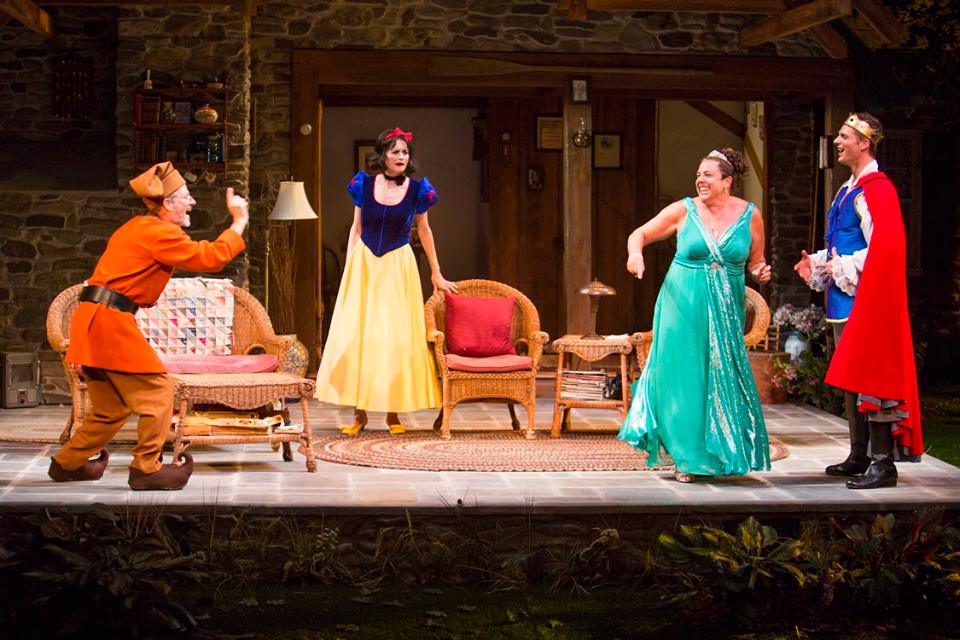
Photo: Jim Cox Martin; Martin Moran, Candy Buckley, Marcia DeBonis, and Tyler Lansing Weaks
Presented by Huntington Theatre Company
By Christopher Durang
Directed by Jessica Stone
Based on the Broadway direction of Nicholas Martin
Jan. 2 – Feb. 1, 2015
BU Theatre
Huntington Avenue
Boston, MA
Huntington on Facebook
Review by Kitty Drexel
“Happy families are all alike; every unhappy family is unhappy in its own way.”
– Leo Tolstoy, Anna Karenina
Review by Kitty Drexel
(Boston, MA) Boston has seen a lot of brilliantly performed Chekhov and Chekhov-adjacent theatre in the past two years. His dramatic writing style is sadistic and depressive, yet he inspires new generations anyway. The Russian tragedian also wrote comedy. He wrote several handfuls of short, comedic plays and an anthology worth of short stories.
There’s a tie in between the Huntington’s 2014 production of The Seagull and the 2015 production of Vanya and Sonia and Masha and Spike (VSMS). Durang’s “corny but sincere” play touches the soul similarly as The Seagull but does so with a vastly different effect; It warms the heart rather than chill the bones. It’s an entirely different beast using the same moving parts and ingredients.
This production is not a parody (Durang so says in the charming interview thoughtfully printed in the VSMS programme). It is an homage written by a man who at one time considered his life from the perspective of a Chekhovian character. It turns out that Durang is quite happy with his life that differs so distinctly from any characters in the Chekhov cannon. So it makes sense that Durang’s play ends happily as well.
VSMS is about a brother and sister, Vanya (Martin Moran) and Sonia (Marcia DeBonis), who live in a peaceful cottage by a lake in Bucks County, PA. They are unhappy because they spent their adults lives caring for their penniless professor parents. Their only inheritance was the cottage, an appreciation for community theatre, and Chekhov. In one day, they go from the depths of life’s doldrums to excitement to mythological proportions: their film star sister Masha (Candy Buckley) has come home with her boy toy Spike (Tyler Lansing Weaks). There’s a costume party, a play reading featuring next door neighbor Nina (Allison Layman), and Masha wants to sell the house. The hubbub is predicted by Cassandra (Haneefah Wood), oracle and housekeeper.
Overall the acting is very good. The cast has built wonderful, rich characters that we come to care a great deal for. In particular, DeBonis as Sonia delivers an exquisite monologue in the second act so endearing that she the entire audience rooting for her. Moran and Buckley give epic tantrums that had us laughing or sighing when we weren’t commiserating with them. The three are a believable family unit. Their camaraderie is comparable to any nuclear family dynamic. They are bitter, sweet, but mostly as kind as any loving family tries to be.
Wood brought the house down as Cassandra. Her monologues redirected the show, injected some necessary levity, and had us spitting our drinks. One might argue that the role of Cassandra is potentially racist. In Greek mythology, Cassandra is a royal princess of Troy cursed by Apollo. I’d like to counter argue that at no time is Cassandra/Wood the butt of any joke. If there is racism it can be pointed directly at the appropriation of Voodoo or Hoodoo ritual which was used to garner several cheap laughs.
The least pleasing aspect of this otherwise perfect performance was the lack of chemistry Buckley and Weaks. They play a couple in lust to their mutual benefit. They were shockingly unbelievable not because a May/December is unlikely (age ain’t nuthin but a number, yo’) but because they did not commit to their roles as lovers. They’d say the appropriate lines with gusto from across the stage. When it comes time for a scene appropriate smooch, the audience is privy to a display of full, frontal indifference. Most importantly, the audience didn’t believe the characters were choosing to be disinterested in each other. If Buckley and Weaks have chosen this approach to their characters relationship then it doesn’t read. Rather, we observe what looks like two actors who don’t trust each other awkwardly phoning it in.
Buckley and Weaks looked uncomfortable. Their discomfort drove the audience to their only option; we decided not to care about Masha and Spike as a couple. As a result, their joint jokes were less funny and their entirely predictable break-up held less weight than other, more insignificant plot points. This could have been avoided with one or two semi-steamy kisses. It’s a shame, really. Kissing attractive strangers is one of the best parts about live theatre.
Vanya and Sonia and Masha and Spike is self-aware and refers frequently to its source materials. It has rich, chewy roles for women over the age of 30 (and one vapid role for an ingenue) and an epic monologue for all major characters. It’s about grief, sadness, love and triumph over the fates. It’s wonderful and it’s not a parody. The set by David Korins is a paradise. Chekhov would have been jealous that he hadn’t written it himself.
